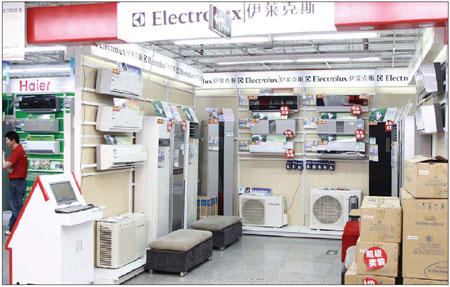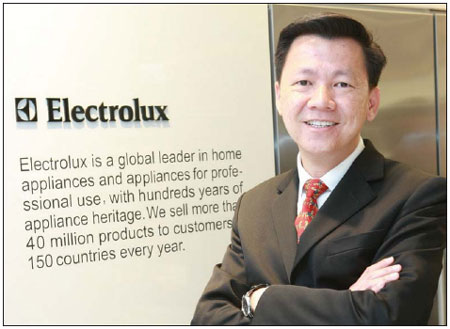Companies
Foreign air conditioner firms feeling the freeze
Updated: 2011-05-20 11:57
By Zhong Nan (China Daily European Weekly)
|
As the market for air conditioners continues to grow, many foreign home-appliance companies such as Electrolux are focusing on high-end consumers. Feng Yongbin / China Daily |
Domestic players have lion’s share, forcing rivals to shift business models
The air conditioner manufacturing business is a tough industry to crack in China for foreign enterprises, according to industry experts.
With Chinese air conditioner makers holding the lion's share of the domestic market, foreign firms such as Electrolux and LG have apparently shifted focus and business models to rich consumers in China with high-end air conditioners.
Last year, Chinese companies sold 90 percent of the air conditioners in China (75.2 million units) while the remaining 10 percent (about 7 million units) were sold by foreign companies, says Xu Dongsheng, secretary-general of China Household Electrical Appliances Association.
But the market for household appliances grew by more than 10 percent in China last year, according to Electrolux's annual report, and experts say that figure has forced many home appliance companies, domestic and foreign, to grab a bigger piece of the pie.
Key to the home appliance industry are two large domestic retail chains, Gome and Suning, which sell a number of brands of air conditioners but mostly carry domestic ones. Sun Fuquan, a senior researcher at the Chinese Academy of Science and Technology for Development, says that their dominance has made it clearly obvious to foreign air conditioning companies operating in China that they have to be more aggressive against domestic competitors.
But whether or not foreign firms are actively changing strategies is largely based on anecdotal information by Chinese experts. Both Electrolux and LG refused to give any revenue figures for the past year or sales figures of air conditioners. What is known is that Electrolux is targeting major cities such as Beijing, Shanghai, Guangzhou, Hangzhou and Chengdu to sell its air conditioners. Consumers in these cities of higher living standards are more financially capable, compared with consumers in second-tier cities, of buying high-end air conditioners.
|
Kong Zhiqiang, chief operating officer of Electrolux Major Appliances China, says the company markets its products to residents in affluent cities. Provided to China Daily |
Kong Zhiqiang, chief operating officer of Electrolux Major Appliances China, says energy-saving and high-tech air conditioners are becoming more attractive and accessible to Chinese consumers, especially in major cities.
Electrolux entered the Chinese market in 1997 with its product line of refrigerators. Today, it has developed a series of home appliances, from washing machines to air conditioners. Last year, the company reportedly ranked among the top 10 in air conditioner sellers in China. Its main competitors in China are Haier, Gree and Midea. A typical split-unit air conditioner costs 7,500 yuan (815 euros) and 3,200 yuan for a wall-mounted air conditioner, according to China Household Electrical Appliances Association.
"Foreign brands don't have sufficient capacity to seize Chinese market shares because they don't have the price advantage. Thus, selling high-tech products in affluent cities is a practical option to avoid all-round competition in China," Xu says. "Every player in China's ai-conditioning market has a chance to please the consumers in different sectors."
Kong says Electrolux has made strides to design more efficient high-tech air conditioners that are low on noise and smaller in size to satisfy the market demand.
"Efficiently reducing energy waste and carbon dioxide impact are our best technologies to attract consumers in the Chinese market," Kong says. "Because of the strong economic growth of China, there will be a huge demand for air conditioners (in more homes). Meanwhile, we are also very aware about China's urban development trend. With fast acceleration of urbanization, we see more people becoming our target consumers."
Chinese consumers tend to be more willing to spend on foreign products. A 2010 market survey of 4,000 people by the China Refrigeration and Air-Conditioning Industry Association shows that 52 percent of consumers prefer foreign brands of refrigerators and air conditioners in Beijing. Thirty-two percent of those surveyed said the quality of foreign brands is very reliable.
Despite that, LG Electronics withdrew recently from the air conditioner market in Southwest China because of what it said was fierce market competition. "Consumers deemed our prices too high and they chose Chinese brands because they are relatively cheaper," says Liu Yang, a marketing employee at the LG Electronics Chengdu branch.
Zhao Ying, a professor at the Institute of Industrial Economics of the Chinese Academy of Social Sciences, says the growing wealth and growth of urban household income will create a powerful consumer group in top-tier cities. He says urban consumers' appetite for high-end European household appliances such as computers, TV and air conditioners will continue to grow.
"Many foreign air conditioner makers such as Electrolux, Siemens, Toshiba, Whirlpool and LG still have sophisticated technologies in producing and improving environmental performance of appliances and setting long-term product targets for energy, water and chemical use even though their prices are higher than Chinese products," Zhao says.
In 2010, China banned the sales of energy-wasting air conditioners by raising the market threshold based on their energy efficiency, which means energy-efficient air conditioners would become the mainstream in the market.
Specials

Room at the inn
The Chinese hotel industry experiences a building boom, prompting fears of oversupply.

Pearls of wisdom
Chinese pearl farmers dominate the world market but now want to work smarter, not harder

Truly a super woman
Li Yuchun first came to prominence in 2005 as the Super Girl winner, and since then has become an international star.

